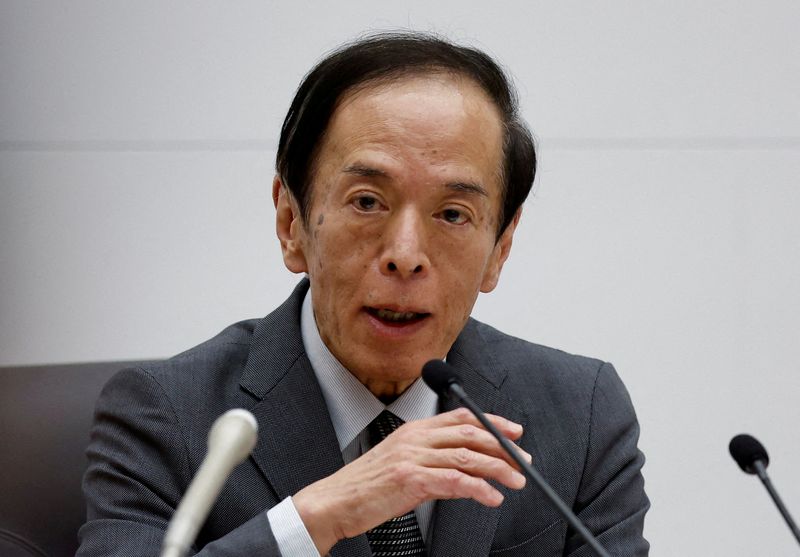By Leika Kihara and Tetsushi Kajimoto
TOKYO (Reuters) -The Bank of Japan maintained ultra-loose policy settings on Tuesday in a widely expected move, as the bank opted to await more evidence on whether wages and prices would rise enough to justify a shift away from massive monetary stimulus.
The central bank also made no change to its dovish policy guidance, dashing hopes among some traders it would tweak the language to signal a near-term end to negative interest rates.
BOJ Governor Kazuo Ueda said prices and wages appeared to be moving in the right direction with labour unions and big firms signalling the chance of sustained wage gains next year. But he warned conditions remained uncertain.
"The chance of trend inflation accelerating towards our price target is gradually heightening," Ueda said in a press conference after the meeting. "But we still need to scrutinise whether a positive wage-inflation cycle will fall in place."
At the two-day meeting that ended on Tuesday, the BOJ kept its short-term rate target at -0.1% and that for the 10-year government bond yield around 0%. It also left unchanged a pledge to ramp up stimulus "without hesitation" if needed.
The yen tumbled and Japanese stocks gained after the BOJ's decision to hold off on phasing out stimulus.
Japan has seen inflation hold above 2% for over a year and some firms have signalled their readiness to keep raising wages, increasing the chance the BOJ will finally abandon its status as a dovish outlier among global central banks.
More than 80% of economists polled by Reuters in November expect the BOJ to end its negative rate policy next year with half of them predicting April as the most likely timing. Some see the chance of a policy shift in January.
Ueda gave no clear signal on how soon the BOJ could exit negative rates, but said there "won't be much data coming in" between now and the next policy meeting on Jan. 22-23.
He also said the BOJ won't rush into raising rates just because the U.S. Federal Reserve could start cutting them soon.
"Obviously, I am always thinking about various scenarios about how we could change policy when certain conditions fall into place," Ueda said.
"But uncertainty over the outlook is extremely high and we have yet to foresee inflation sustainably and stably achieving our target. As such, it's hard to show now with a high degree of certainty how we can exit."
Since taking the helm in April, Ueda has moved towards dismantling the radical stimulus of his predecessor by relaxing the bank's grip on long-term rates in July and October. Markets see the next step to be a hike in short-term rates to around zero from the current -0.1%.
Some analysts warn that consumption, which is already softening, could worsen further next year if wages do not rise enough to cushion the blow from rising inflation.
But the BOJ maintained its view that consumption continues to increase moderately, underscoring its conviction the economy is on track for a recovery.
ALL IN THE TIMING
While inflation-adjusted real wages continue to fall, Ueda said that alone won't be an impediment to normalise ultra-easy policy if the BOJ can foresee real wages turning positive.
"The prospects for (sustainably achieving our price target) are gradually heightening. But in terms of whether the threshold would be met, we'd prefer to look at more data," he said.
Analysts say the BOJ may find it easier to move in months like January and April, when it releases a quarterly outlook report with fresh growth and price projections.
But sharp shifts in global monetary policy may complicate the BOJ's decision with U.S. and European central banks signalling that they are done hiking rates.
Raising rates at a time other central banks are cutting them could trigger a spike in the yen that hurts big manufacturers' profits and discourages them from hiking wages, analysts say.
"While mentioning how Japan is moving closer to achieving the price target, Ueda probably wants to retain a free hand on the timing of an exit," said Yasunari Ueno, chief market economist at Mizuho Securities.

Stefan Angrick, senior economist at Moody's (NYSE:MCO) Analytics, expects the BOJ to drop negative interest rate policy in April, around when early results for the spring wage negotiations come in.
"That said, it's hard to see the BOJ lifting rates much further than 0%," Angrick said. "The weak state of the economy, the appreciating yen, decelerating inflation, and global central banks getting ready to cut rates suggest further hikes are not in the cards."